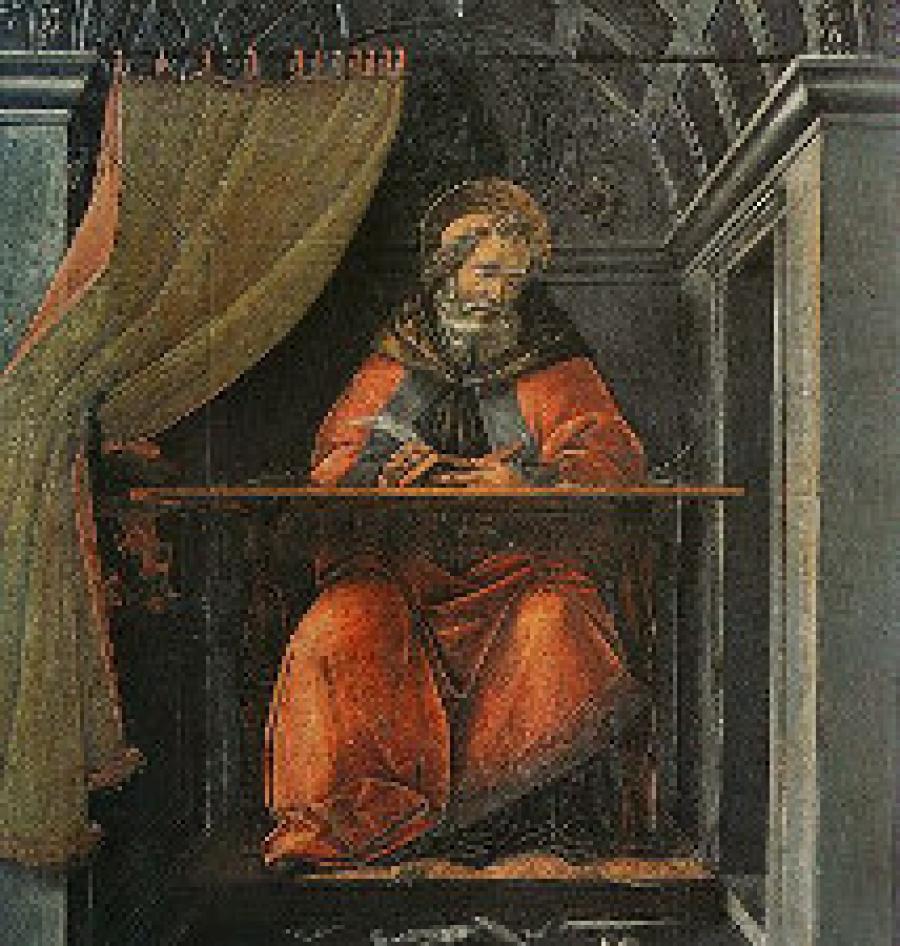Augustine
Image

Detail from Saint Augustine in His Study by Sandro Botticelli, 1494
Have you met Augustinus Aurelius? If not, you really should. If so, you likely love him or hate him; but either way, you realize he wields considerable influence upon every inhabitant of the Western Hemisphere. The Latin influence upon our languages owes much to him, as does our philosophy of international relations. The Roman Catholic Church and the Protestant Reformers each drew heavily from his writings in their history-altering contentions with one another. To our day, scholars carefully consider his insights on a plethora of philosophical and theological questions that shape our culture and self-understanding. He wrote so deeply and penetratingly that his insights are part of the warp and woof of Western identity.
Augustine, as he came to be known, was born in AD 354 in modern Algeria. His father, Patricius, was a pagan and minor Roman official; his mother, Monica, a devout Christian. Young Augustine was, by all accounts, a very bad boy.
Recognizing their son’s intellectual brilliance, his parents arranged for the finest classical education. Augustine eventually landed in Carthage—the cultural and economic centerpiece of northern Africa. Reared by a father driven to see his son succeed, but disinterested in moral training, young Augustine pursued sensual pleasures with near abandon. “In Carthage,” he wrote, “a cauldron of unholy loves was sizzling and crackling around me.” Glutting his every sexual urge troubled his conscience. Yet he characterized his prayers to his mother’s God during these years as: “Lord, give me continence and chastity, but not now.”
Despite his mother’s persistent influence, Christianity held no interest for Augustine. He knew himself to be incapable of restricting his sexual passions to the confines of marriage, and he deemed Christianity the resort of simple-minded people. He embraced the popular cult Manichaeism for its rationalistic pedigree; but soon detected serious flaws no one could answer to his satisfaction. Gaining audience with the cult’s foremost intellect convinced Augustine that Manichaeism was untrue. Disappointed, he continued his quest.
By now a famed teacher of rhetoric whose intellectual gifts were revered, Augustine accepted a teaching post in Milan. Here he saturated his mind in Neo-Platonic thought. In the works of Plotinus, Augustine unwittingly discovered answers to his strongest objections to Christianity, most notably how evil can exist in a world created by a good God.
As a rhetorician by trade, Augustine also began attending sermons of the famed orator, Bishop Ambrose. What was for Augustine a field trip to study the craft of persuasive speech, was used by God as a laboratory to transform Augustine’s soul. Ambrose’s command of Greek philosophy, coupled with his careful exposition of Scripture, slowly convinced Augustine that Christianity could be rationally defended as absolute truth. Ambrose’s sermons also demonstrated from Scripture, and illustrated from history, how God’s grace can break the power of sensuality with a higher love and the superior pleasures found in relationship with God.
Under Ambrose’s preaching, Augustine came to the conclusion that the faith he had long despised was indeed the truth. But the thought of abandoning his profligate lifestyle and his career as a rhetorician—a profession that marshaled arguments with no regard for truth-telling—traumatized Augustine. In a bout of intense spiritual travail, he found himself one day inside a walled garden. The voice of a child at play rang out over the wall: “Take up and read, take up and read.” As if heeding the voice of God, Augustine picked up a scroll and read a passage from the book of Romans. In that moment, God’s Spirit drew Augustine to throw his dependence wholly upon God for saving grace. He realized his moral debauchery was not a pit from which he could rescue himself by self-discipline or good works. Only God could rescue him. Only God’s power could liberate him. “Now my soul was free,” he testified, “from the biting cares of seeking and getting, weltering in filth, and scratching off the itch of lust.” His “past life vanished,” and Augustine now not only attended Ambrose’s sermons, he communed with the church.
In those days I never tired of the wonderful sweetness of considering the depth of Your purposes concerning the salvation of mankind. How I wept during Your hymns and canticles; my inmost being was touched by the voices of Your sweet-tuned church! The voices flowed into my ears, and the truth distilled into my heart, out of which the passions of my devotion overflowed, and tears ran down, and I was happy in all of this.
And happy in God Augustine remained until death. He left behind not only a substantial body of timeless writings, but the story of a man whose natural passions were supernaturally transformed by God. His legacy is encapsulated in his timeless prayer: “You awaken us to delight in Your praise, for You made us for Yourself, and our hearts are restless until they rest in You.”
Pastor Dan Miller Bio
Dan Miller has served as the Senior Pastor of Eden Baptist Church since 1989. He graduated from Pillsbury Baptist Bible College in 1984 and his graduate degrees include the MA in history from Minnesota State University, MDiv and ThM from Central Baptist Theological Seminary and DMin from Trinity Evangelical Divinity School. Dan is married to Beth and the Lord has blessed them with four children: Ethan, Levi, Reed and Whitney.
- 6 views


Discussion